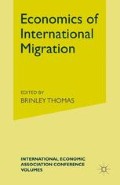Abstract
Germany is generally regarded as a country with a tradition of emigration, but this description has for many years ceased to apply to the territory of modern Germany. The idea is mainly based on the experience of the nineteenth century, when millions of Germans were leaving their home country under the pressure of a rapidly growing population in order to enjoy better opportunities overseas. Since that time there has been a fundamental change in the demographic, economic, and social conditions in Germany and overseas; this has brought about a simultaneous change in the volume, structure, and economic significance of migratory movements. If Germany is still looked upon as a characteristic country of emigration, this is largely because there has been much public interest in oversea settlement even during periods when Germany or important parts of Germany had a big inward balance. Until recently there were only statistics on oversea emigration but hardly any showing the volume and structure of oversea immigration, of intra-European migration, and of internal migration in Germany. These various movements are closely connected with one another; their economic consequences cannot be considered separately. This chapter will describe the interdependence of these movements from the historical and economic points of view, and it will attempt to explain present and future movements on the basis of that interdependence.
Access this chapter
Tax calculation will be finalised at checkout
Purchases are for personal use only
Preview
Unable to display preview. Download preview PDF.
Notes
See, for example, Michael P. Fogarty, Economic Control, London, 1955, p. 197: ‘. The postwar problems of refugees from Eastern Europe, and especially of the refugee population of Germany, has had to be solved very largely by emigration.’
Author information
Authors and Affiliations
Editor information
Copyright information
© 1958 International Economic Association
About this chapter
Cite this chapter
Wander, H. (1958). Migration and the German Economy. In: Thomas, B. (eds) Economics of International Migration. International Economic Association Conference Volumes. Palgrave Macmillan, London. https://doi.org/10.1007/978-1-349-08443-2_14
Download citation
DOI: https://doi.org/10.1007/978-1-349-08443-2_14
Publisher Name: Palgrave Macmillan, London
Print ISBN: 978-1-349-08445-6
Online ISBN: 978-1-349-08443-2
eBook Packages: Palgrave Economics & Finance CollectionEconomics and Finance (R0)

